Bordered by the North Atlantic, North Pacific and Arctic Oceans, Canada has unsurprisingly become a haven for some of nature’s most magnificent marine life - including whales.
Some 30 species of whale have made the 200,000km of coastline surrounding the country their home and, naturally, the country boasts some of the best whale watching on offer around the world.
The opportunity to encounter these striking creatures in their own environment is an attractive prospect for those booking holidays to Canada. The best months to view whales varies by species and region, but in general the whale watching season runs from May to October.
From common whale spotting sites to what to pack ahead of your seafaring trip, follow our guide to answer everything you want to know about whale watching in Canada.
Where and when to whale watch
With its three adjacent oceans supporting various whale migratory routes, the chances of seeing these giants of the sea up close are significantly increased. That’s not to say, however, that every whale trip will be a success. Depending on the time of year, weather and where in the country you choose to visit, the whales can sometimes be a little hard to spot, but for many, the scenery aboard your vessel of choice is half the excitement in whale watching anyway. Plenty of tours also offer to take you out again for free if you don’t spot a whale on your first trip!
As a general rule, the map below shows the provinces and species that frequent the Canadian coastline.
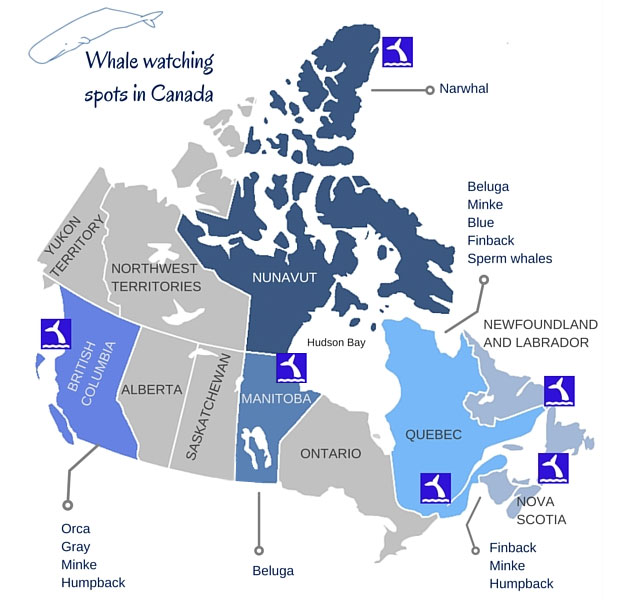
There are some areas that prove more fruitful for spectators, as we learn from whale experts Orca Dreams:
“There are a few areas that are popular for whale watching. The area around Victoria is well known for their southern resident killer whale (orca) populations. There are about 90 whales in the group consisting of 3 pods. Victoria is a very convenient place to go whale watching from, as it is a hub of tourism for Vancouver Island. Most of the whale watching is within the protected waters of the Gulf Islands so in most tours during the summer months, the sea conditions can be quite comfortable.
“The west coast of Vancouver Island is another great place for whale watching, most notably out of Tofino or Ucluelet. It is possible to see killer whales, humpback whales and gray whales. The west coast is most famous for viewing the gray whales as they migrate close to the Vancouver Island shore in the spring and fall. On a calm day it is possible to watch whales pass by from the many beaches and trails that extend along much of the coast between Ucluelet and Tofino.”
Providing an immersive experience, Orca Dreams caters to wildlife watchers (and zoologists in the making) at their whale watching camp in the stunning Broughton Archipelago off the mainland British Columbia province in western Canada.
Day tours and safari camps like Orca Dreams’ run throughout the spring, summer and autumn months. The shores around Vancouver also prove a practical destination to see whales for those making the most of the vibrant city in British Columbia, before heading on an extended tour of sorts aboard a scenic Vancouver and Alaska cruise towards the arctic waters of the Gulf of Alaska.

Towards the eastern shoreline, the maritime regions of Quebec boast some of the best whale-watching sites in the world.
Bringing together the four coastal regions, Bas-Saint-Laurent, Gaspesie, Cote-Nord and Iles de la Madeleine, tourist guide Quebec Maritime gives us the low down on whale watching in the French-influenced province:
“Tadoussac is where most of our whale-watching activities take place. In some places you can even watch them from the shore. Hundreds of whales make it their annual destination after a long migration of thousands of kilometres. Why? The St. Lawrence is teeming with fish and plankton, and feeding is the main activity of the summer. It is a genuine open-air buffet for whales!
“Between May and October, up to 13 species of cetaceans are found in the salty waters of the St. Lawrence (River and Gulf), including blue whales, the largest animals on the planet, and impressive humpbacks.”
For those interested in learning more about the whales that frequent Canada’s waters, Quebec Maritime suggests visiting the Marine Mammal Interpretation Centre in Tadoussac. Just three hours down the coast from Quebec City, visitors can make the most of Canada car rental with a road trip to Tadoussac – being sure to take in the sea views on the way. Owned by the Group for Research and Education on Marine Mammals, a visit to the centre is the perfect complement to any whale watching excursion and with a friendly biologist on site, you can ask all the questions you want.

Planning ahead of your trip
For first-time passengers, the excitement of encountering one of the ocean’s greatest creatures will be unrivalled, but ensure you’re well prepared before you takes to the waves.
Before you depart
When booking a day trip or tour, Destination Canada recommends checking whether the company you are booked with offers the chance to rebook for free if you don’t see whales. As they say: “bear in mind that this is nature, not a ‘show’ that you can turn on or off. Sometimes you can return without having seen whales so be prepared to manage your expectations.”
Remember: “Whales are wild animals and can travel up to a 100 miles in a day making sightings very unpredictable. One day you may be able to see several pods while the next day you may not see any. Enjoy being out on the water as there is so much to see, being close to whales is only part of the experience,” adds Orca Dreams.
If you are prone to sea sickness, take medication prior to departure. Better yet, choose a location that is in more protected waters such as Johnstone Strait and the Broughton Archipelago or near Victoria.

Dressing the part
“One of the main tips would be to dress warm even during summer season” says Quebec Maritime.
“Even if it is 20 degrees on the land, the St. Lawrence stays at a temperature of about 4 degrees. Add humidity to that, and wind, and it can get really cold during your sea excursion. If you go on a cruise boat, bring a jacket with you, warm socks and don’t hesitate to bring gloves, toque, or scarf. Better to be warmer than cold!”
When whale watching, you’ll likely be out on the open water for a few hours. The water magnifies harmful rays from the sun, so make sure you also have sunscreen. Polarizing sunglasses will also help reduce glare and enable you to see whales further in the distance.
Of course, binoculars are ever a useful tool for seeing whales up close from the safety of your vessel. Providing a greater view of whales, binoculars will also help you pick out other wildlife and details in your surroundings.
Capturing the moment
For many, whale watching is a once-in-a-lifetime opportunity and, naturally, you’ll want to capture the moment to refer back to later when telling friends and family about your travels in Canada.
Taking a camera with an appropriate lens is recommended, but as Destination Canada explains: “If your camera is only small you may be challenged to get a good shot of the whales that captures their size and magnitude in the ocean.
“You may want to make a decision in advance as to whether you will just observe and enjoy the moment for yourself.”
It’s worth remembering that if you’re constantly looking through the eyepiece of a camera or zooming in with a smart phone, you might miss spotting a whale outside of this limited field of vision. Capturing the moment is important but so too is just simply appreciating the outstanding natural beauty and incredible wildlife Canada has to offer.

Image Credit: Thomas Hubauer (flickr.com), Bodoklecksel, Hans Bernhard (wikimedia.org)
Latest Articles
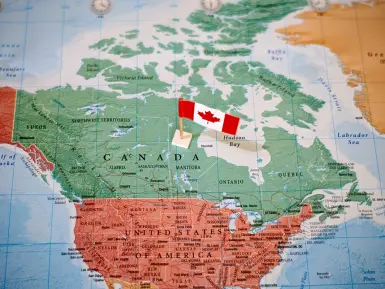
How big is Canada?


03/07/2025
A question that many people ask is ‘how big is Canada’? Most people know Canada is big, but just how big is big?
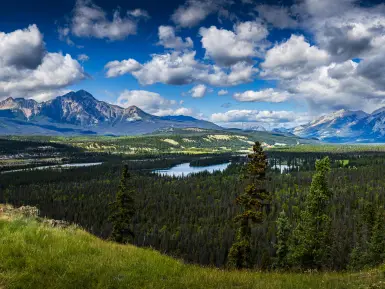
Canada Advocate Q&A: Trish & Cathie's Race Across The World Adventure


01/07/2025
Join us this Canada Day as we celebrate the breathtaking beauty of Canada with Trish & Cathie, the incredible winners of Race Across the World series 3! Discover Canada through the inspiring lens of two adventurers who truly fell in love with its majestic landscapes and vibrant culture.
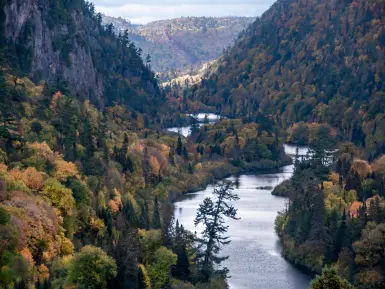
Sault Ste. Marie Travel Guide: Undiscovered Canada


30/06/2025
Sault Ste. Marie in Canada is one of Ontario’s premier adventure towns, known for its rugged lakes, mountains, and world-class outdoor activities.
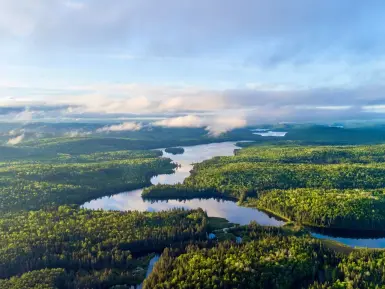
Algonquin Park Travel Guide: Iconic Canada


25/06/2025
Algonquin Provincial Park is one of Canada’s most spectacular wilderness regions. The park, which is Ontario’s oldest and largest provincial park, is filled with rocky ridges, fragrant maples and thousands of lakes.












